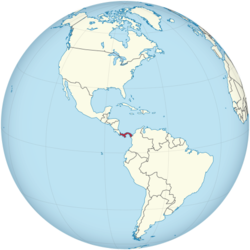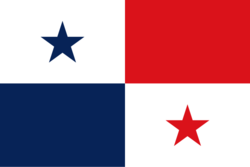Panama
 | |
 | |
| Location | Central America |
| Type | |
| Member of | International Criminal Court, Organisation of American States, UN |
| Has a globally important shipping route. | |
Panama is a country in South America with geopolitical importance due to it's location. It is considered a tax haven [1] and it's population is 80% catholic.[2]
Contents
Importance
The Panama Canal is a shipping route of international importance.
History
- Full article:
 United States invasion of Panama
United States invasion of Panama
- Full article:
The country was invaded by the US when Manuel Noriega ceased being a reliable executor of instructions from the US.
Army abolition
It abolished its army in 1990. Its northern neighbour, Costa Rica, abolished its army in 1949.
Related Quotations
| Page | Quote | Author | Date |
|---|---|---|---|
| Hoodwinked | “Panama's chief of government, Omar Torrijos, foresaw this meltdown and understood its implications back in 1978, when I was an economic hit man (EHM). He and I were standing on the deck of a sailing yacht docked at Contadora Island, a safe haven where U.S. politicians and corporate executives enjoyed sex and drugs away from the prying eyes of the international press. Omar told me that he was not about to be corrupted by me. He said that his goal was to set his people free from "Yankee shackles," to make sure his country controlled the canal, and to help Latin America liberate itself from the very thing I represented and he referred to as "predatory capitalism."
"You know," he added, "what I'm suggesting will ultimately benefit your children too." He explained that the system I was promoting where a few exploited the many was doomed. "The same as the old Spanish Empire — it will implode." He took a drag off his Cuban cigar and exhaled the smoke slowly, like a man blowing a kiss. "Unless you and I and all our friends fight the predatory capitalists," he warned, "the global economy will go into shock." He glanced across the water and then back at me. "No permitas que te engañen," he said ("Don't allow yourself to be hoodwinked.") Three decades later, Omar is dead, likely assassinated because he refused to succumb to our attempts to bring him around, but his words ring true. For that reason I chose one of them as the title of my latest book, Hoodwinked.” | John Perkins | 2009 |
| Manuel Noriega | “He was a pawn in an international game that was way bigger than him and he certainly paid dearly," said Barbara Trent, a filmmaker who directed "The Panama Deception," a 1992 documentary about the U.S. invasion.
"He was a small-time player catapulted to international fame by the U.S. government and the media to drum up support for a ruthless invasion," Trent added. Working with the CIA Noriega ruled Panama from 1983 to 1989. Before and during that time, he worked with multiple U.S. intelligence agencies who agreed to ignore allegations that he was a drug trafficker in exchange for a staunch anti-communist ally in Central America during the height of the Cold War. Noriega was paid handsomely for his help, about $10,000 per month at one point, according to John Dinges, author of "Our Man in Panama: How General Noriega Used the United States and Made Millions in Drugs and Arms (1990)." "The relationship with the CIA and the Pentagon was quite intense in the early '80s," Dinges told ABC News. "He was considered an important asset, and everyone in the documents I've read spoke very highly of him. He was trusted to the extent that you trust someone who is a paid intelligence asset.” | Manuel Noriega ABC News Kaelyn Forde | 2017 |
| Manuel Noriega | “In 1992, Noriega was tried and convicted on eight drug trafficking and conspiracy counts in federal court in Miami. His 40-year sentence was reduced by 10 years after a former CIA station chief and a former U.S. ambassador spoke on his behalf.
By that time, I had already begun investigating the story. I found more than reasonable doubt about his guilt. The government prosecuted the case with the testimony of 26 convicted drug traffickers who received plea bargains that allowed them to get out of prison and, in some cases, keep their drug profits. One of them was Carlos Lehder, a neo-Nazi from Colombia, then the most important trafficker ever captured by the United States. He had never met Noriega—and neither had the other dealers who testified against him. U.S. District Judge William Hoeveler, who tried the case, invited me to his home after Noriega's conviction and sentencing for a series of unusual talks in which he expressed concern about how the trial and verdict would be judged. "I hope, in the end, we'll be able to say that justice was served," he said. He and other U.S. officials took solace in the fact that even if the drug conviction was questionable, Noriega was clearly a murderer. But the sources I interviewed raised serious questions about one charge against him. In 1993, Noriega was convicted in absentia in Panama of conspiracy in the 1985 murder of Hugo Spadafora, a political protégé turned opponent. A key piece of evidence was that the National Security Agency had intercepted a remote telephone communication in which Noriega allegedly ordered the killing: "What do you do with a rabid dog?... You cut off its head." Multiple U.S. sources told me the intercept did not exist. They said the NSA did not have the capability at that time to capture communications between Noriega—who was in France when Spadafora was killed—and his minions in the Panamanian jungle. I determined that the charges had been made up in part by a Panamanian newspaper columnist and author, Guillermo Sánchez Borbón. He admitted to me he could cite no source for reporting the killing of Spadafora in a book, In the Time of the Tyrants, that he co-wrote with an American expatriate, Richard Koster. "It is a political book, not a historical book," Sanchez Borbón said. "It has its inexactitudes."” | Manuel Noriega Peter Eisner | 2017 |
Group
| Group | Start | Description |
|---|---|---|
| Mossack Fonseca | 1977 | Panamanian law firm at the centre of the Panama Papers data leak. |
Citizens of Panama on Wikispooks
| Title | Born | Died | Description |
|---|---|---|---|
| Ricardo Alberto Arias | 11 September 1940 | US educated Panamanian Ambassador to the United Nations, where he was Chairman of the UNSC's Counter-Terrorism Committee | |
| Gabriel Lewis Galindo | 19 December 1996 | Panamanian diplomat-banker with ties to the US deep state. |